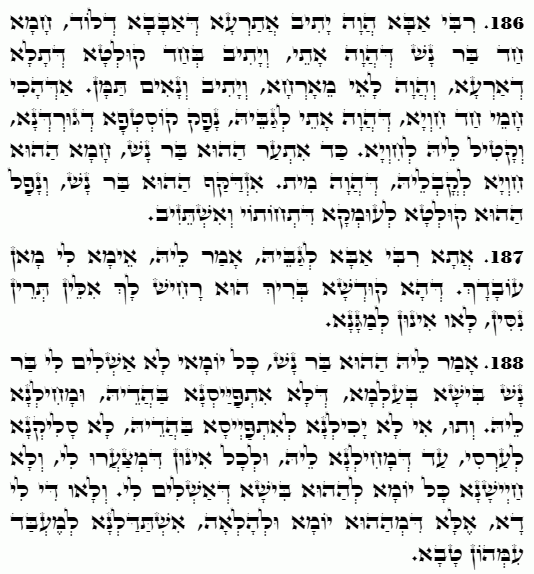Daily Zohar # 4739 – Miketz – Acting beyond forgiveness attracts miracles
Daily Zohar 4739

Hebrew translation:
187. בָּא אֵלָיו רַבִּי אַבָּא, אָמַר לוֹ, אֱמֹר לִי מַה מַּעֲשֶׂיךָ, שֶׁהֲרֵי הַקָּדוֹשׁ בָּרוּךְ הוּא הִרְחִישׁ לְךָ שְׁנֵי הַנִּסִּים הַלָּלוּ שֶׁאֵינָם לְחִנָּם?
188. אָמַר לוֹ אוֹתוֹ הָאִישׁ, כָּל יָמַי לֹא שִׁלֵּם לִי אִישׁ רָע בָּעוֹלָם שֶׁלֹּא הִתְפַּיַּסְתִּי עִמּוֹ וּמָחַלְתִּי לוֹ. וְעוֹד, אִם לֹא יָכֹלְתִּי לְהִתְפַּיֵּס עִמּוֹ, לֹא עָלִיתִי עַל מִטָּתִי עַד שֶׁמָּחַלְתִּי לוֹ וּלְכָל אוֹתָם שֶׁצִּעֲרוּ אוֹתִי, וְלֹא חָשַׁשְׁתִּי כָּל הַיּוֹם לְאוֹתוֹ הָרָע שֶׁשִּׁלֵּם לִי, וְלֹא דַי לִי זֶה, אֶלָּא שֶׁמֵּאוֹתוֹ הַיּוֹם וָהָלְאָה הִשְׁתַּדַּלְתִּי לַעֲשׂוֹת עִמָּהֶם טוֹב.
.
Zohar Miketz
Continued from previous DZ
#186
Rabbi Abba was sitting at the entrance of the city gate of Lod. He saw a man come and sit on a protrusion extending from the side of the mountain. The man was weary from the road and sat down to rest and fell asleep. Meanwhile, Rabbi Abba saw a snake approaching the man. Suddenly, a creature called Kustpa de-Gurdana appeared and killed the snake.
When the man awoke, he saw the dead snake lying before him. He got up, and the protrusion he had been sitting on broke off from the mountain and fell into the valley below. Had the man delayed even a moment before rising, he would have fallen with the protrusion into the valley and been killed.
Notes:
(שרץ, a kind of weasel or mongoose, or a wood piece with thorns, https://www.sefaria.org/Nefesh_David_on_Zohar.1.201b.3?lang=bi&with=all&lang2=en)
While there is no definitive identification of “Kustpa de-Gurdana,” the description of its actions strongly suggests a creature with the attributes of a mongoose or a weasel, which are known for their agility and predatory instincts.
#187
Rabbi Abba approached him and said, “Tell me about your deeds, for the Holy One, Blessed be He, has caused these two miracles to happen for you—to save you from the snake and the ledge that fell. They were not without reason.”
Notes:
Rabbi Abba recognizes Hashem’s hand in the man’s miraculous salvation and seeks to understand the righteous deeds that warranted these interventions.
#188
The man said to him, “All my days, no person has wronged me without my seeking reconciliation and forgiving them. Moreover, if I was unable to reconcile with them, I would not go to bed before forgiving them and anyone else who caused me distress. I did not harbor hatred for them all day for the wrong they had done to me. Not only this but from that day onward, I would go out of my way to do good for them.
Notes:
This section connects to Joseph’s behavior with his brothers.
The man explains the guiding principle of his life: he practices complete forgiveness and does not hold grudges against those who wrong him. He ensures that he forgives others, even if reconciliation is not possible, before ending his day. Furthermore, he goes beyond forgiveness, actively seeking to do good for those who had caused him harm. This reflects a profound level of spiritual and moral character, emphasizing love, compassion, and overcoming resentment, nullifying the ego.
His actions resonate with the Torah’s teachings about emulating the ways of the Holy One, Blessed be He, and fostering peace and kindness in human relationships. Such behavior is seen as meritorious and deserving of Hashem’s protection, aligning with the idea that those who practice compassion receive compassion from above.
{||}

 Previous: Miketz
Previous: Miketz

